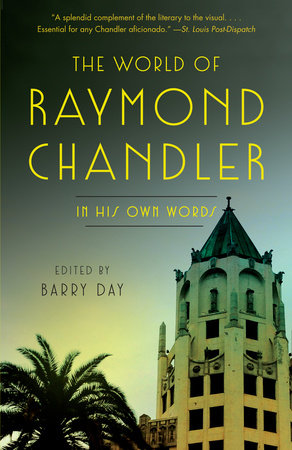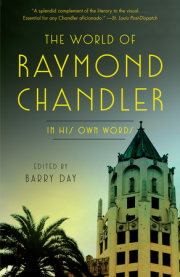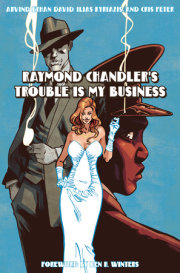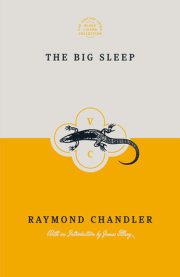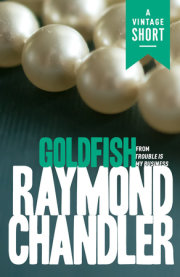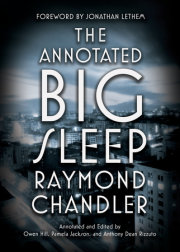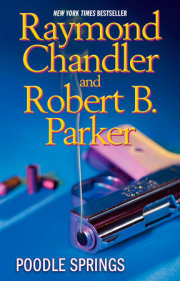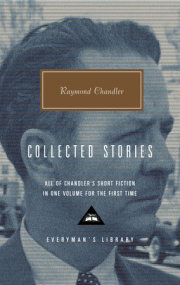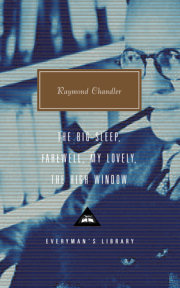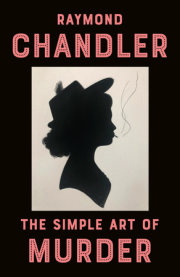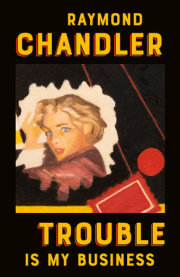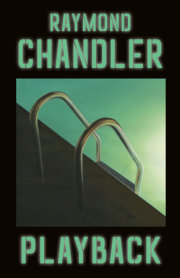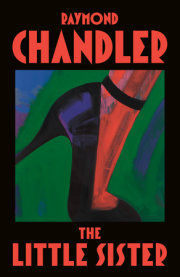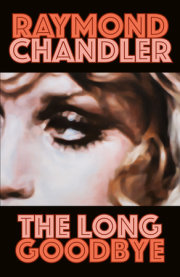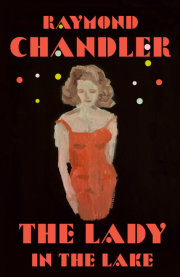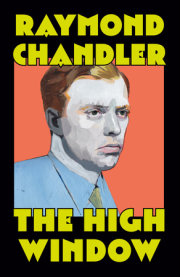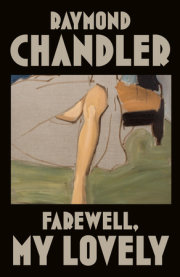Five The City of the angels
Scattered diamond points at first, the lights drew together and became a jeweled wristlet laid out in the show window of the night.
—“The Man Who Liked Dogs”
“Everything’s for sale in California.”
—
The Lady in the Lake
“We make the finest packages in the world, Mr. Marlowe. The stuff inside it is mostly junk.”
—Harlan Potter in
The Long Goodbye
“a big hard-boiled city with no more personality than a paper cup.”
“It is the same in all big cities, amigo.”
—
The Little Sister
I smelled Los Angeles before I got to it. It smelled stale and old like a living room that had been closed too long. But the colored light fooled you.
—
The Little Sister
Crime writer Ross Macdonald—considered by many to be the leading neo-Chandler—wrote that Chandler “invested the sun-blinded streets of Los Angeles with a romantic presence.” But the romance was strictly of the film noir variety.
It was a time when the city was trying to carve out an identity for itself. There are those who will tell you it still is. Hollywood was not the whole of Los Angeles; but in a very unreal sense, all of Los Angeles was Hollywood.
Architectural imagination ran riot. French
châteaux sat cheek by jowl with Tudor castles and Italian villas. You might go to a restaurant like the Brown Derby, built to resemble a hat, or a bank that resembled an animal. A bottling plant a block long might have the exterior of an ocean liner with portholes for windows; a cinema posed as a Chinese pagoda—and still does. Everything was made to look like something else, and nothing seemed built to last—just like the film sets over in Hollywood.
There was money aplenty . . .
There were great silent estates, with twelve-foot walls and wrought-iron gates and ornamental hedges; and inside, if you could get inside, a special brand of sunshine, very quiet, put up in noise-proof containers just for the upper classes.
—
Farewell, My Lovely
The bright gardens had a haunted look, as though wild eyes were watching . . . from behind the bushes, as though the sunshine itself had a mysterous something in the light.
—
The Big Sleep
The house itself was not so much. It was smaller than Buckingham Palace, rather gray for California, and probably had fewer windows than the Chrysler Building . . . A man in a striped vest and gilt buttons opened the door, bowed, took my hat and was through for the day.
—
Farewell, My Lovely
Inside the houses—were you privileged enough to get a peep—you were likely to find
the kind of room where people sit on floor cushions with their feet in their laps and sip absinthe through lumps of sugar and talk from the back of their throats in high, affected voices, and some of them just squeak. It was a room where anything could happen except work.
—
Farewell, My Lovely
On the floor might be “a rug as thin as silk and as old as Aesop’s aunt” (“Mandarin’s Jade”) or, alternatively, “You could just man- age to walk on the carpet without waders” (
The High Window). “A peach-colored Chinese rug a gopher could have spent a week in without showing his nose above the nap” (“Mandarin’s Jade”).
When the old-money moment was past, the glow faded fast. The color scheme of the old Chateau Berry was bile green, linseed-poultice brown, sidewalk gray and monkey- bottom blue. It was as restful as a split lip.
—
The Little Sister
Raymond Chandler, one gathers, did not approve of the filthy rich, if only because of what they did with their money.
Chandler remembered the city as being “hot and dry when I first went there, with tropical rains in winter and sunshine at least nine-tenths of the year.”
Marlowe also has his memories . . .
“I used to like this town,” I said . . . “A long time ago. There were trees along Wilshire Boulevard. Beverly Hills was a country town. Westwood was bare hills and lots offering at eleven hundred dollars and no takers. Hollywood was a bunch of frame houses on the interurban line. Los Angeles was just a big dry sunny place with ugly homes and no style, but goodhearted and peaceful. It had the climate they just yap about now. People used to sleep out on porches. Little groups who thought they were intellectual used to call it the Athens of America. It wasn’t that, but it wasn’t a neon-lighted slum either.”
—
The Little Sister
It was a very different Los Angeles in those days. The 1911 Census had estimated 350,000 people but the trickle of immigrants was becoming a flood. By 1930 it would be 1.5 million and a lot of things would have changed.
An oil boom of massive proportions was under way, creating money and jobs—and it didn’t much care for whom. Money poured into the state with the encouragement of the federal government. Before long the economy was that of a fair-sized country and, since it was easy money, it easily attracted organized crime.
World War II aggravated the situation. The setting-up of factories for arms manufacturing made California the epicenter of the defense industry, and Washington—anxious to help rebuild the region after the Depression of the 1930s—gave preference in the granting of contracts.
And still people poured in. By the 1950s the city boasted an electronic sign that showed the population increase minute-by-minute. What it did not show was the range of problems that unplanned influx brought with it.
It was all too much too soon for a town that had no evolved culture of its own. What had emerged, Chandler saw as being just as much the product of bland mass production and advertising. He called it the “culture of the filter-tipped cigarette . . . leading to a steakless steak to be broiled on a heatless broiler in a non-existent oven and eaten by a toothless ghost.”
In the books Marlowe is constantly crisscrossing the terrain, noting the morphing of one aspect into another—rarely for the better—and always making us aware of the geographical context in which this amorphous new “Athens” exists. Behind it, the timeless range of mountains. Before it, “the great fat solid Pacific trudging into shore like a scrubwoman going home . . . a California ocean. California, the department store state. The most of everything and the best of nothing” (
The Little Sister). “There is a touch of the desert about every- thing in California and about the minds of the people who live here.” (Letter to Blanche Knopf). We are constantly being made aware of natural beauty corrupted by unnatural man.
In more mellow mood, the sea takes on more romantic imagery . . .
Under the thinning fog the surf curled and creamed, almost without sound, like a thought trying to form itself on the edge of consciousness.
—
The Big Sleep
The swell is as gentle as an old lady singing hymns.
—
The Long Goodbye In the cove the waves don’t break, they slide in politely, like floor walkers.
—
Playback
In that mood the city itself has its own kind of beauty, though the imagery is invariably man-made: “The lights of the city were a vast golden carpet, stitched with brilliant splashes of red and green and blue and purple” (“Pick-Up on Noon Street”) . . . “The lights of Hollywood and L.A. winked at him. Searchlight beams probed the cloudless sky as if searching for bombing planes” (“The King in Yel low”) . . . “the stars were as bright and artificial as stars of chromium on a sky of black velvet” (
Farewell, My Lovely) . . . “a slanting grey rain like a swung curtain of crystal beads” (
The Big Sleep) . . . “The light hit pencils of rain and made silver wires of them” (“The Curtain”) . . .
The valley moonlight was so sharp that the black shadows looked as though they had been cut with an engraving tool . . . ten thou- sand lighted windows and the stars hanging down over them politely, not getting too close.
—
The High Window
There was loneliness and the smell of kelp and the smell of wild sage from the hills. A yellow window hung here and there, all by itself, like the last orange.
—
Farewell, My Lovely Spring rustling in the air like a paper bag blowing along a concrete sidewalk.
—
Farewell, My Lovely
We curved through the bright mile or two of the Sunset Strip past the antique shops with famous screen names on them, past the win- dows full of point lace and ancient pewter, past the gleaming new nightclubs with famous chefs and equally famous gambling rooms, run by polished graduates of the Purple Gang, past the Georgian Colonial vogue, now old hat, past the handsome modernistic buildings in which the Hollywood flesh-peddlers never stop talking money, past a drive-in lunch which somehow didn’t belong, even though the girls wore white silk blouses and drum majorettes’ shakos and nothing below the hips but glazed Hessian boots. Past all this and down a wide smooth curve to the bridle path of Beverly Hills and lights to the south, all colors of the spectrum and crystal clear in an evening without fog, past the shadowed mansions up on the hills to the north, past Beverly Hills altogether and up into the twisting foothill boulevard and the sudden cool dusk and the drift of wind from the sea.
—
Farewell, My Lovely
Beverly Hills was such a nice place before the Phoenicians took it over. Now it’s just a setting for an enormous confidence racket.
As time—and Marlowe—go by, another incidental dimension emerges in Chandler’s panorama of the city. Not only is it growing before our eyes but we are made aware of proximity. The bad and the beautiful exist literally cheek by jowl. Two blocks from obscene wealth is abject poverty. The dreams of Hollywood coexist happily with the worst urban nightmares . . . and nobody seems to notice or care too much.
Even Nature is not to be trusted. It’s always lying in wait for you . . .
There was a desert wind blowing that night. It was one of those dry Santa Anas that come down through the mountain passes and curl your hair and make your nerves jump and your skin itch. On nights like that every booze party ends in a fight. Meek little wives feel the edge of the carving knife and study their husband’s necks. Anything can happen. You can even get a full glass of beer at a cocktail lounge.
—“Red Wind”
Copyright © 2014 by Raymond Chandler. All rights reserved. No part of this excerpt may be reproduced or reprinted without permission in writing from the publisher.

